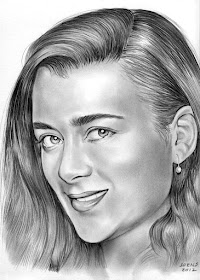
Monday, February 27, 2012
Sunday, February 26, 2012
Justin Bieber - by request
 This was a special request work for some young fans.. enjoy!
This was a special request work for some young fans.. enjoy!Friday, February 24, 2012
Thursday, February 23, 2012
David Keith McCallum, Jr. "Ducky" - NCIS

Ziva David - NCIS

Ziva David (Hebrew: זיוה דויד, pronounced [ˈziva daˈvid], Ziva: "Brilliance", David: "Beloved"; English pronunciation: /ˈziːvə dəˈviːd/; born November 12, 1982, Be'er Sheva,Israel[1][2]) is a fictional character from the NCIS television series by CBS Television, portrayed by Chilean actress Coté de Pablo.
David was introduced in the Season 3 premiere episode "Kill Ari (Part 1)" and became a regular cast member from the episode "Silver War", replacing Caitlin "Kate" Todd, portrayed by Sasha Alexander who had been in the show from the first episode, "Yankee White" and was later killed at the hands of Ziva's half-brother, Ari Haswari in the last few seconds of the Season 2 finale, "Twilight".
Ziva was an agent of the Israeli Mossad, originally assigned to NCIS as a liaison officer, a position she held for four years until she returned to Mossad in the Season 6 finale, "Aliyah". After being presumed dead, she was eventually saved by Gibbs, Tony and McGee who brought her back to America to a reunion with Ducky and Abby.
Having recovered, Ziva later quit working for Mossad in Season 7 and became a probationary NCIS agent.
Upon passing her citizenship exam, Ziva was sworn in as a U.S. citizen with McGee, Ducky, Abby and Palmer being present at her ceremony.[3]
In the Season 9 premiere episode "Nature of the Beast", after being a Probie for nearly two or three years, Ziva finally earned her status as an NCIS Special Agent. Source: Wikipedia
Alfred Hitchcock

Sir Alfred Joseph Hitchcock, KBE (13 August 1899 – 29 April 1980)[2] was a British film director and producer.[3] He pioneered many techniques in the suspense andpsychological thriller genres. After a successful career in British cinema in both silent films and early talkies, Hitchcock moved to Hollywood. In 1956 he became an American citizen while remaining a British subject.
Over a career spanning more than half a century, Hitchcock fashioned for himself a distinctive and recognisable directorial style.[4] He pioneered the use of a camera made to move in a way that mimics a person's gaze, forcing viewers to engage in a form of voyeurism.[5] He framed shots to maximise anxiety, fear, or empathy, and used innovativefilm editing.[5] His stories frequently feature fugitives on the run from the law alongside "icy blonde" female characters.[6] Many of Hitchcock's films have twist endings and thrilling plots featuring depictions of violence, murder, and crime, although many of the mysteries function as decoys or "MacGuffins" meant only to serve thematic elements in the film and the extremely complex psychological examinations of the characters. Hitchcock's films also borrow many themes from psychoanalysis and feature strong sexual undertones. Through his cameo appearances in his own films, interviews, film trailers, and the television program Alfred Hitchcock Presents, he became a cultural icon.
Hitchcock directed more than fifty feature films in a career spanning six decades. Often regarded as the greatest British filmmaker, he came first in a 2007 poll of film critics in Britain's Daily Telegraph, which said: "Unquestionably the greatest filmmaker to emerge from these islands, Hitchcock did more than any director to shape modern cinema, which would be utterly different without him. His flair was for narrative, cruelly withholding crucial information (from his characters and from us) and engaging the emotions of the audience like no one else."[7][8] The magazine MovieMaker has described him as the most influential filmmaker of all-time,[9] and he is widely regarded as one of cinema's most significant artists.[10] Source: Wikipedia



